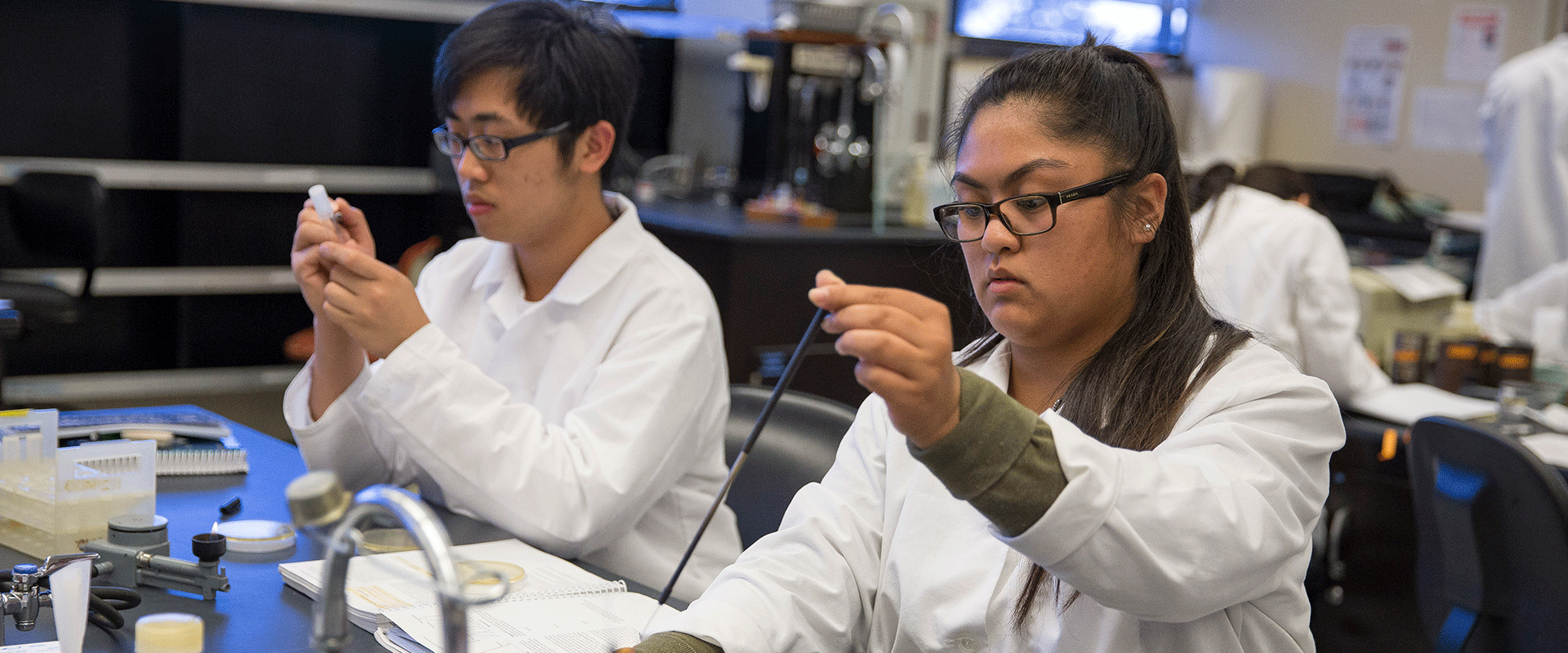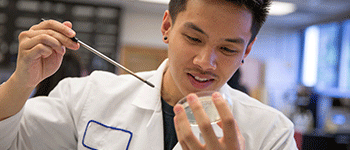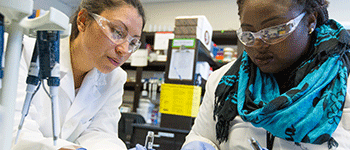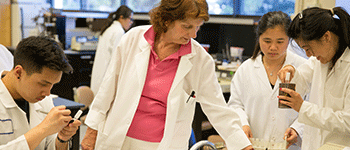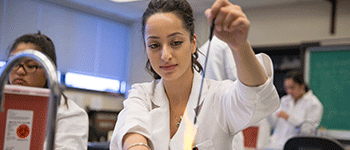Undergraduate Programs
The Department of Chemistry & Biochemistry offers student-centered educational environment for undergraduate and graduate students. Our degree programs are designed to prepare you for graduate study, health professions programs, laboratory positions with biotechnology and pharmaceutical companies, and professional careers such as teaching. Our overarching objective is to educate and train versatile chemists and biochemists who not only understand the theoretical basis and practical applications of their discipline but are well-prepared to succeed in graduate school and professional positions.
Programs
The BS Chemistry and BS Biochemistry degrees are designed for those who are interested in a career as a chemist or a biochemist. The degrees provide preparation for graduate programs in chemistry and biochemistry or for jobs in the chemical or biochemical industry. The BA chemistry is designed for those who need a solid background in chemistry for a degree in a closely related field, such as pharmacy or dental school, science education, or technical writing. However, students who earn any of these degrees are eligible for admission to graduate programs, jobs in the biotech industry, or medical, dental, pharmacy school, or other pre-health programs.
Side-by-Side Comparison of Chemistry Majors
| Requirement | BA Chemistry | BS Biochemistry | BS Chemistry |
|---|---|---|---|
| General Chemistry with Labs | one year | one year | one year |
| Organic Chemistry | one year with labs | one year with first semester of lab | one year with labs |
| Calculus | one year | one year | one year |
| General College Physics | one year with labs | one year with labs | one year of physics with calculus with labs |
| Physics and Calculus for Chemistry | N/A | N/A | one semester |
| Quantitative Analysis | one semester with lab | one semester of lecture | one semester with lab |
| Inorganic Chemistry | one semester | N/A | one semester |
| Physical Chemistry | one semester, general | one year, general | one year |
| Biochemistry | one semester | one year | one semester |
| Lab | N/A | one semester of biochemistry lab | one semester of inorganic chemistry lab one semester of physical chemistry lab |
| Writing in the Discipline | one semester | one semester | one semester |
| Electives | one chemistry lab elective course | 12 units of upper-division CHEM or BIOL electives including three labs | 9 units of upper-division CHEM electives |
| Total Units | 56 | 72 | 72 |
The department utilizes prerequisite checking during registration. The purpose of prerequisite checking is to ensure that students who are enrolled in heavily impacted courses (including CHEM 130, 215, 300, 320, 233, 335, 340, 343 and 349) are sufficiently prepared to be successful in them.
Most students will fall under one of the three scenarios outlined below:
- If your course equivalencies are already documented on ASSIST and included in your Degree Progress Report, you do not need to take any action.
- If you have already completed a Course Equivalency Form and had these signed by an advisor, you need to provide this information to the Department of Chemistry & Biochemistry ASAP.
- If you have not completed a Course Equivalency Form for general chemistry, calculus and/or physics courses taken at another institution, you need to do have these evaluated and signed by an appropriate advisor and provide this information to the Department of Chemistry & Biochemistry ASAP.
A copy of the Course Equivalency Form can be downloaded here: Course Equivalency Form (PDF). Fill this out and have it signed by an advisor from the appropriate department (i.e., the Math Department for calculus courses, Physics Department for physics courses and the Department of Chemistry and Biochemistry for chemistry courses). Bring the signed form to Thornton Hall room 806 so that this information can be entered into our database. Failure to do so may result in you being blocked from registering for chemistry courses at the time of registration, which may impede your progress toward graduation.
If you have questions about this process, please contact the Department of Chemistry and Biochemistry at (415) 338-1288.
Download Adobe Reader to view the PDF files in this section. Accessibility Note: These PDFs do not meet accessibility standards. If you encounter problems accessing the information, please contact the Department.
Student Research & Activities
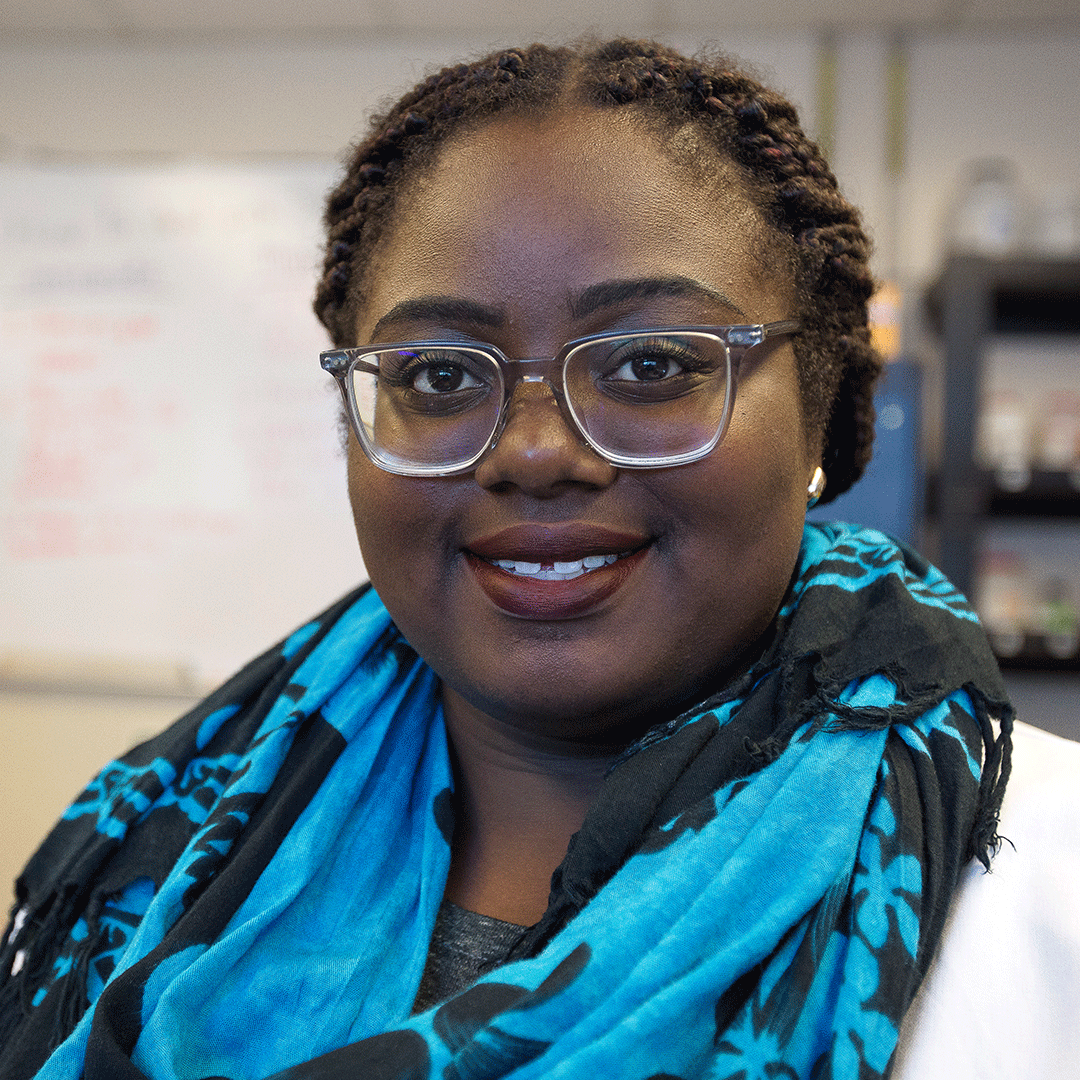
The department hosts a seminar series with speakers from universities, national labs and industry to talk about current and cutting edge research.
Our students present their own research at national and international scientific conferences including those of the American Chemical Society, the American Society for Biochemistry and Molecular Biology, the American Geophysical Union, the Society for the Advancement of Chicano and Native American Scientists, the Materials Research Society and the Biophysical Society. Students also present their research at local and regional scientific meetings, such as the annual College of Science and Engineering Student Project Showcase.
Students are active in student chapters of the ACS, the ASBMB and SACNAS, and participate in local science education outreach programs such as the ACS Family Science Night and the Bay Area Science Festival.
Resources
Prospective Students
We are happy to hear that you are considering applying to San Francisco State University (SF State) and are particularly pleased that you are considering a major in chemistry or biochemistry.
The Department of Chemistry & Biochemistry offers an excellent educational environment for students. Our faculty are dedicated to providing our students with excellent classroom and laboratory instruction, extensive hands-on experience using modern instrumentation, and one-on-one advising. In addition, students have the opportunity to participate in research on significant chemical or biochemical problems under the direct supervision of faculty members who are recognized authorities in their fields. A degree in chemistry or biochemistry opens a multitude of employment opportunities in companies within and outside of the Bay Area, particularly in biotech and pharmaceutical companies. Many of our graduates go on to pursue advanced degrees in M.S. and Ph.D. programs and gain entry into medical, dental, pharmacy, and veterinary schools. Our Department also features an active student-run organization called the Chemistry & Biochemistry Student Association (CBSA), which offers a variety of activities to build community among students and faculty and enhance the educational experience of chemistry and biochemistry majors at SF State. Find more information on the CBSA website.
As a prospective student, you probably have many questions about our programs and should be aware that our department is committed to providing our students with timely and regular advising. You are strongly encouraged to attend an orientation session that will be offered at the beginning of every semester. You should note that all of our undergraduate majors are required to meet with an advisor regularly to assess their progress towards their degree and answer questions about courses, electives, SF State policies and procedures, research and scholarship opportunities and career options. If you have more immediate questions about our programs, please stop by our department office in Thornton Hall room 806 or contact one of our office staff at (415) 338-1288 or chemist@sfsu.edu.
We look forward to meeting with you and wish you the best in your academic endeavors.
Sincerely,
Dr. Bruce Manning, Chair
The Department of Chemistry and Biochemistry offers an excellent educational environment for undergraduate and graduate students. Our mission is to educate, train and produce versatile chemists and biochemists who understand both the theoretical basis and practical applications of their discipline. Department faculty provide quality instruction across a wide range of sub-disciplines. Our degree programs are designed to prepare students for various professional positions (i.e., biotechnology and pharmaceutical companies, chemical manufacturing, and other laboratory-based industries), health professions (i.e., medical, pharmacy, and dental school), graduate study, and teaching positions.
- Our faculty provide quality instruction across a wide range of specialties.
- Students have the opportunity to pursue undergraduate research under the direct supervision of faculty.
- Faculty Research Interests are in many exciting areas of chemistry and biochemistry
- The department has an excellent collection of modern facilities and instrumentation, including an NMR Facility, Mass Spectrometry Facility and the Computational Chemistry and Visualization (CCV) Laboratory.
- Our Department Equipment List will give you an idea of the type of instrumentation that you will be trained to use.
- The student-run Chemistry and Biochemistry Student Association (CBSA) offers a variety of activities including social events and free tutoring.
The Department of Chemistry & Biochemistry is housed in two adjacent buildings, Thornton Hall and the Science Building. Some relevant facts and figures about the department are listed below.
- The department currently employs 17 permanent tenure-line faculty and 20 temporary lecturer faculty.
- The department currently has approximately 400 undergraduate students in all 3 chemistry and biochemistry degree programs.
- The department currently has approximately 30 graduate students in chemistry and biochemistry.
- Department faculty support their research by bringing in grant funds from external sources.
The department's degree programs are designed to prepare students for a variety of laboratory-focused chemistry and biochemistry careers. These same programs also can be used as a foundation for students interested in other career paths, such as high school science teaching, sales or marketing, management, environmental advocacy, patent law, technical writing and forensic science to name just a few. Many of our graduates use their degrees as preparation for graduate studies in chemistry or biochemistry. A chemistry and biochemistry degree provides excellent preparation for medical, pharmacy, dental and veterinary schools.
Minimal high school preparation for SF State's undergraduate programs in chemistry and biochemistry includes two years of algebra, one year of geometry, one half year of trigonometry, one year of physics and one year of chemistry. Students who have not had these classes may take the equivalent courses at SF State listed below.
Students are expected to meet basic mathematics requirements prior to enrollment at SF State. This can be achieved by passing the SAT math exam or ELM exam with a total score of 550 or higher or by meeting the appropriate coursework with grades of C- or better. For more details on the various exemptions, students are urged to refer to the SF State Bulletin or consult with an advisor.
MATH 197: Prelude to Calculus I
MATH 198: Prelude to Calculus II
MATH 199: Precalculus
PHYS 101: Conceptual Physics
CHEM 100: Preparation for Chemistry
Many of our majors are transfer students who have come from local community colleges or other 4-year colleges and universities. Most have already completed some chemistry, math and physics courses that are equivalent to comparable SF State courses. The process of determining equivalency is called articulation.
Articulation requires a formal, written agreement that identifies courses (or sequences of courses) on a "sending" campus that are comparable to, or acceptable in lieu of, specific course requirements at a "receiving" campus. Successful completion of an articulated course(s) assures the student and the faculty that the student has taken the appropriate course(s), received the necessary instruction and preparation and that similar outcomes can be assured, enabling progression to the next level of instruction at the receiving institution.
The equivalency of many math and science courses at local institutions has already been evaluated. However, this process of evaluating equivalency is ongoing, as academic institutions are constantly revising their programs and courses and hence the equivalency of a specific course from some other university may not be known. Given that determining equivalency of courses offered at every other university in California, the U.S. and the world is an impossible task, determination of equivalency must often done on a case-by-case basis.
In order to facilitate this process, students should fill out the department's course equivalency form and submit it along with either their DARS report or an unofficial copy of their transcripts from the university certifying their completion of the course and stipulating the letter grade and either a copy of the syllabus from the course or a description of the course from the University catalog which will aid the department in determining equivalency.
Students should note that in meeting the University requirements for the number of upper-division credits, no course transferred from a community college may count towards upper-division credit. The most common example where this problem occurs is in organic chemistry. Although organic chemistry courses transferred from a community college may meet the department's degree requirements, it does not count towards meeting the total number of upper-division units required for graduation with a degree in SF State's chemistry and biochemistry programs.
For more information on articulation and course equivalencies, students can refer to ASSIST (Articulation System Stimulating Interinstitutional Student Transfer), which allows the user to request information on course equivalencies between the university where the course was taken and the "receiving" university.
The Department of Chemistry & Biochemistry at SF State offers the BA in Chemistry, BS in Chemistry and BS in Biochemistry degrees.
The BA in Chemistry is well suited for students whose career goals involve the integration of chemistry with other fields of study such as secondary education, business, technical sales and forensic science. It includes fewer units in the major and can be combined with a minor in engineering, business, social sciences, or the humanities to prepare students for certain career paths (see section on career opportunities above). Students considering a career in teaching science at the K-12 level should consult with an advisor from the Education Department, as specific courses are required for the credential program.
The BS in Chemistry, which is approved by the American Chemical Society, prepares students to pursue careers in traditional chemistry-oriented positions. Compared to the BA in Chemistry, this program has a heavier emphasis on chemistry, calculus and physics. The extensive lab training provides excellent preparation for a career in industry and a strong foundation for graduate studies or entry into a medical or dental school.
The BS in Biochemistry, which is approved by the American Society for Biochemistry & Molecular Biology, is designed for students who wish to be well qualified for a career in biochemistry, modern areas of biology, or biotechnology. This program allows students to tailor their program to pursue additional courses in molecular biology and clinical sciences. The extensive lab training provides excellent preparation for a career in the pharmaceutical industry and a strong foundation for graduate studies or entry into a medical or dental school.
See the Future Students website for information on applying to SF State, entrance requirements, entry level English and math exams, residency requirements, tours of campus, etc.
Download Adobe Reader to view the PDF files on this page. Accessibility Note: These PDFs do not meet accessibility standards. If you encounter problems accessing the information, please contact the Department.
